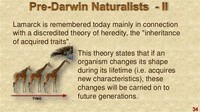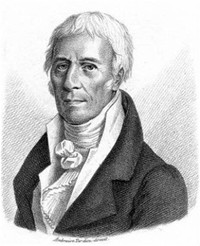Facts about Lamarck

In 1988, John Cairns, Julie Overbaugh, and Stefan Miller suggested in a publication in Nature that some E. coli mutations could develop in a Lamarckian manner (Cairns et al.

A form of Lamarckism was revived in the Soviet Union of the 1930s when Trofim Lysenko promoted Lysenkoism, which suited the ideological opposition of Joseph Stalin to genetics.

Lamarck, however, is remembered today mainly in connection with his now superseded theory of heredity, the "inheritance of acquired traits" (see Lamarckism).

During his lifetime, Lamarck became controversial; his criticism of the paleontologist Georges Cuvier’s anti-evolutionary stance won him no friends.

Lamarck proposed that individual efforts during the lifetime of the organisms were the main mechanism driving species to adaptation, as they supposedly would acquire adaptive changes and pass them on to offspring.

Neo-Lamarckism is a theory of inheritance based on a modification and extension of Lamarckism, essentially maintaining the principle that genetic changes can be influenced and directed by environmental factors.

Lamarck was also one of the first to use the term biology in its modern sense, and he coined the term invertebrates.

Lamarck died 30 years before the first publication of Charles Darwin's Origin of Species.

On the other hand, Lamarck's preeminent theory, the inheritance of acquired characteristics (also called the theory of adaptation), is now widely rejected.

An important point in Lamarck's favor at the time was that his theory contained a mechanism describing how variation is maintained, which Darwin’s own theory lacked.

Lamarck saw spontaneous generation as being ongoing, with the simple organisms thus created being transmuted over time (by his mechanism) becoming more complex and closer to some notional idea of perfection.

Lamarck believed in organic evolution at a time when there was no theoretical framework to explain evolution.

Lamarck’s theories gained initial acceptance because the mechanisms of Mendelian inheritance were not elucidated until later in the nineteenth Century, after Lamarck's death.

Epigenetic inheritance is thought to be Lamarckian, by some, but this is not widely accepted by evolutionary biologists.

The same gene is passed on to offspring, and the environment determines its expression, so this process still fails to be Lamarckian.

The memetic theory of cultural evolution could be considered a form of Lamarckian inheritance of non-genetic traits.

Later, Mendelian genetics supplanted the notion of inheritance of acquired traits, eventually leading to the development of the modern evolutionary synthesis, and the general abandonment of the Lamarckian theory of evolution in biology.

Subsequently Lamarck proposed in his Philosophie Zoologique of 1809 the theory that characteristics that were "needed" were acquired (or diminished) during the lifetime of an organism were then passed on to the offspring.

After years working on plants, Lamarck was appointed curator of invertebrates.

Lamarck was born in Bazentin-le-Petit, Picardie into an impoverished family (hence the title of chevalier, knight).

McDougall attributed this to some sort of Lamarckian evolutionary process.

Jean Molino (2000) has proposed that Lamarckian evolution may be accurately applied to cultural evolution.


